The iPhone 5 Review
by Anand Lal Shimpi, Brian Klug & Vivek Gowri on October 16, 2012 11:33 AM EST- Posted in
- Smartphones
- Apple
- Mobile
- iPhone 5
Six Generations of iPhones: Performance Compared
Section by Anand Shimpi
Cross platform smartphone benchmarks are interesting, but they do come with their own sets of issues. Before we get to that analysis however, let's look at how the iPhone's performance has improved over the past six generations. Luckily Brian has a set of all of the iPhones so he was able to run a few tests on all of the devices, each running the latest supported OS.
We'll start with SunSpider 0.9.1, our trusty javascript performance test:
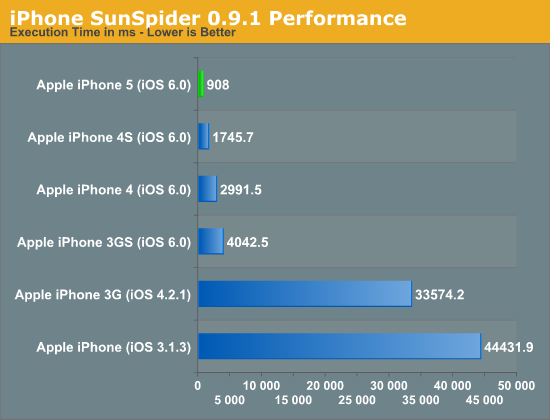
The transition from iPhone to iPhone 3G shows you just how much additional performance you can squeeze out of simply a software change. There's likely even more that could be squeezed out of that ARM11 platform, unfortunately newer versions of Safari/iOS aren't supported on the iPhone 3G so we're left with a runtime that's around 37x the length of a single run on the iPhone 5.
The rest of the devices support and run iOS 6, so we're at least on a level software playing field. The performance boost from one generation to the next is quite significant still. Going by this chart alone, the best balance of minimal upgrades and maximum perceived improvement would be from the original iPhone to the 3GS then again from the 3GS to the 5.
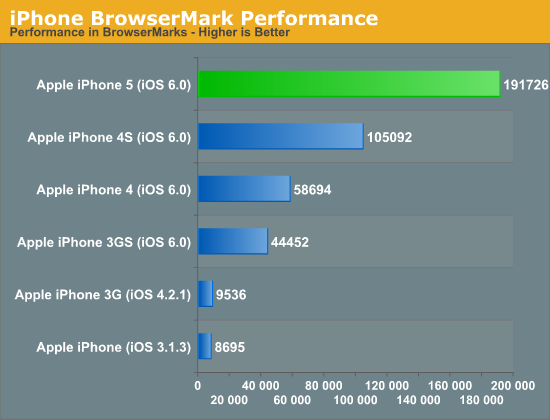
The BrowserMark results tell a similar story. The jump from the ARM11 based iPhone/iPhone 3G to the 3GS running iOS 6 is huge. Both the 4S and 5 offer doublings in performance, albeit for different reasons. The 4S delivered a doubling thanks to a doubling of core count and a move to the Cortex A9, while the iPhone 5 doubled performance through a much higher clock speed and microarchitectural improvements.
Finally we have Geekbench 2, which only runs on the iOS 6 supported devices so we say goodbye to the original iPhone and iPhone 3G:
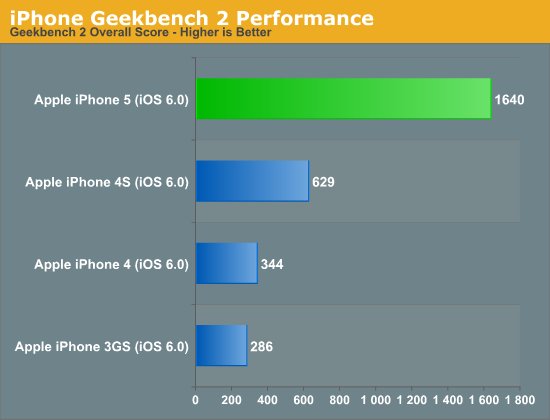
None of the jumps looks as dramatic as the move to the iPhone 5, but we already know why. The Swift CPU architecture does a great job improving memory performance, which shows up quite nicely in a lot of the Geekbench 2 subtests.
On the PC side we often talk about 20% performance improvements from one generation to the next being significant. It's clear that the mobile SoC space is still operating along a hyper Moore's Law curve. The rate of progress will eventually slow down, but I don't see that happening for at least another couple generations. The move to ARM's Cortex A15 will be met with another increase in performance (and a similarly large set of power challenges), and whatever comes next will push smartphones into a completely new category of performance.


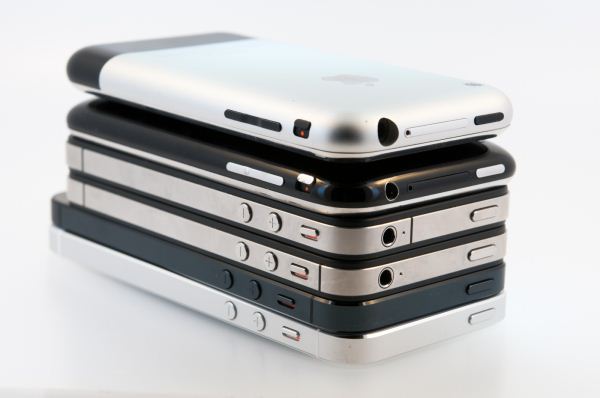
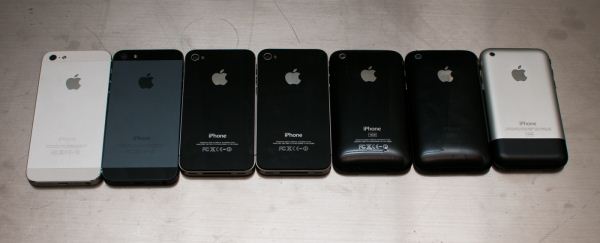








276 Comments
View All Comments
Spunjji - Friday, October 19, 2012 - link
Incorrect. See HP Elitebook, Sony Vaio S15, Asus Zenbook, etc... that does depend on your definition of "trackpad that doesn't suck", but personally I'd take an Elitebook with actual buttons over the Apple effort any day, so that bit really is swings and roundabouts.doobydoo - Friday, October 19, 2012 - link
'so that bit really is swings and roundabouts'That's like saying a Ferrari is overpriced because you prefer cup holders so therefore you get more car for less when you buy a Skoda.
Also, you have to consider size, weight, battery life and performance.
You can't find a single laptop which matches the air on all of the above.
Sufo - Tuesday, October 16, 2012 - link
You're right to an extent, however it's worth mentioning that it's a lot easier to find unlocked non-apple phones at good prices on auction sites etc. It's very hard to get much less than list price on iphones, even several months after release.As for Macs, it depends entirely on which country you buy them in - in the UK for example, it is cheaper to buy a plane ticket to the States and buy a 15" w/ retina there than it is to buy one locally - the same could not be said for similarly specced PCs.
Spunjji - Friday, October 19, 2012 - link
Truth. Unfortunately Apple prices are subject to the perception that Apple products hold their value better, which in a purely practical sense really isn't any more true than for any other product. But the market does as the market does. :)Spunjji - Friday, October 19, 2012 - link
People who defend Apple's prices with fake numbers just want to whine about people who don't like Apple... see how easy that argument is to return? Please.A5 - Tuesday, October 16, 2012 - link
I'd say the smartphone market does a fairly good job of dropping prices on products that need it.The only product I can really think of that is an outstanding "value" proposition would be the $350 unlocked GNex combined with a prepaid plan. The current high-end devices (One X, GS3, iP5) all seem to be fairly priced relative to each other.
steven75 - Wednesday, October 17, 2012 - link
When I was looking at what I should price my 2.5 year old iPhone 4 at, I found the GS3 is already down to iPhone 4S prices on the resale market.Android phones just don't hold resale value vs iPhones, even the flagships, it's Mac vs PC all over again in that area. ;)
pseudonymmster - Tuesday, October 16, 2012 - link
"A processor license gives you the right to taken an ARM designed CPU core..."I think "taken" should've been "take" :D
karasaj - Tuesday, October 16, 2012 - link
Nice review guys... all I have to say :Pjjj - Tuesday, October 16, 2012 - link
On the scuffing, would you buy a car that rusts if you drive in the rain? This is clearly a design flaw, a sane company would recall the product and use a more apropriate material.You shouldn't be telling people to deal with it (except the ones that are happy to own the first colour changing phone).The size of the SoC in phones matters less and less as we go forward,more integration,more specialized cores,just because it's there it doesn't mean that much of the area is powered at the same time and the cost of silicon is less of a problem too.The limitation is power and /heat not area.
" if everyone moves to Cortex A15 based designs." - everybody ,in the high end, moves to quad Krait since A15 is likely to be just dual core for a while.
Nice review overall but,as always, your battery of benchmarks is misleading and no storage perf,really hoped for more to better understand this new core.